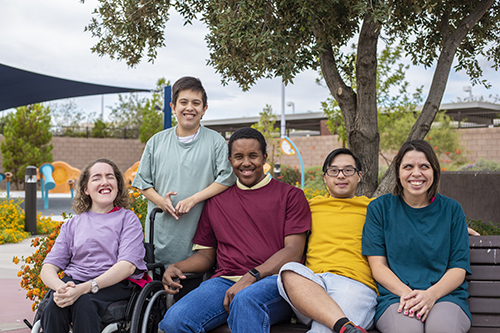Community Supports
 About Community Supports
About Community Supports
The Florida Center for Inclusive Communities' efforts are aligned with the Developmental Disabilities Act whereby individuals with developmental disabilities are mandated to have the right "to live independently, to exert control and choice over their own lives, and to fully participate in and contribute to their communities through full integration and inclusion in the economic, political, social, cultural, and educational mainstream of United States society."
As a result, the efforts of the FCIC focus on individuals with developmental disabilities achieving full integration and inclusion in society. In this section, we offer information about our community supports initiatives and resources focused on Florida's community supports and services.
Programs and Activities
Autism Friendly Business Initiative
The Center for Autism & Related Disabilities (CARD) at USF, creates a more welcoming and sensory friendly experience for people of all abilities. CARD-USF has provided training and technical assistance to businesses in the 14-county area. For more information, visit the Autism Friendly Business Initiative.
Emergency Preparedness for People with Disabilities
It is important to prepare and plan in order to handle an emergency situation effectively. To ensure that emergency responders can properly respond to your needs, many residents with special needs can register their information with their county emergency management agency or personal physician. Many counties require that this is done prior to the hurricane season, so pre-register today. "If your medical condition requires that you be hospitalized during a disaster, consult with your physician about getting an authorization letter for preadmission." (St. Petersburg Times April 2007).
For comprehensive information, visit the emergency preparedness page.
Disability Awareness for Law Enforcement Training Curriculum
 In 2008, the Hillsborough County Sherriff Office’s (HCSO) asked to collaborate with FCIC staff in the development of a "Disability Awareness for Law Enforcement" training curriculum focused on creating awareness and understanding. With funding and support from the Florida Office of Disability and Health at the University of Florida, the FCIC has now published this field-tested, 4-hour curriculum on disability awareness for training law enforcement personnel. The curriculum emphasizes person first language, inclusion and interacting and communicating with individuals with developmental disabilities, intellectual disabilities, mobility disabilities (including cerebral palsy), mental health conditions, deafness, blindness, epilepsy, autism, and Alzheimer’s disease.
In 2008, the Hillsborough County Sherriff Office’s (HCSO) asked to collaborate with FCIC staff in the development of a "Disability Awareness for Law Enforcement" training curriculum focused on creating awareness and understanding. With funding and support from the Florida Office of Disability and Health at the University of Florida, the FCIC has now published this field-tested, 4-hour curriculum on disability awareness for training law enforcement personnel. The curriculum emphasizes person first language, inclusion and interacting and communicating with individuals with developmental disabilities, intellectual disabilities, mobility disabilities (including cerebral palsy), mental health conditions, deafness, blindness, epilepsy, autism, and Alzheimer’s disease.
A curriculum kit is available on CD which includes three sections: 1) Training Overview, 2) Participant Manual, and 3) Trainer Materials. The CD also contains video vignettes, experiential training activities, and interviews with self-advocates. If you would like to obtain a copy of this curriculum free-of-charge, please email Denise Barnes.
Florida Resources
Florida Self-Advocates Network'D (FL SAND)
Florida Self-Advocates Network'D (FL SAND) is a statewide association of self-advocates led by self-advocates that exists to support advocacy efforts at the local, grassroots level and to provide a united voice for statewide issues and topics that are important to self-advocates and all persons with disabilities in Florida.
Legislative Platforms & Advocacy
Develop your legislative advocacy skills and learn more about the Council’s legislative priorities. Work as an individual or as part of team to advocate for legislation that may drastically affect the lives of people with intellectual and developmental disabilities, their families, and caregivers.
Housing Accommodations
People with disabilities not only face several barriers to obtaining housing, but a disability can unfortunately create challenges to maintaining housing as well. Some of these barriers are physical, while others are created by policies, rules, and regulations. Disability Rights Florida provides resources that allow individuals with disabilities to learn about housing accommodations, your rights with respect to living independently, and much more.
 |
Glossary of Terms: Commonly Used DD Acronyms & Abbreviations People with disabilities, parents, teachers, caregivers, and professionals in the disability world have their own language, often referred to as “Alphabet Soup” because it is a mess of acronyms and abbreviations. People not familiar to this world often talk about how confusing it is. |

